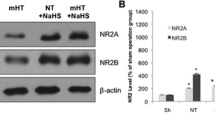Abstract
The temporal constraints of protection of neuronal damage by post-ischemic hypothermia was investigated in the gerbil model of global ischemia. Three experimental paradigms were used: 1) Hypothermia was initiated prior to ischemia followed by warming to normothermia immediately post ischemia; 2) Hypothermia of different durations was initiated immediately after reflow and 3) Six hours of hypothermia was initiated at various times following reperfusion. Hypothermia during 5 minutes of ischemia followed by warming to normal body temperature immediately post ischemia resulted in near complete protection of the hippocampus from CA1 cell loss. Hypothermie durations of 1/2, 1, 2, 4, and 6 hours beginning immediately following reperfusion resulted in progressively increased protection from ischemie damage (6±6%, 21±10%, 34±15%, 75±16% and 77±12%, respectively). Six hours of hypothermia delayed for 1 hour after reperfusion resulted in 49±9% protection. No reduction of ischemic damage was observed if 6 hours of hypothermia was delayed for 3 hour after reflow. These data suggest that: 1) Hypothermia during ischemia protects the brain from damage; 2) Hypothermia initiated immediately following reperfusion must have a duration of 2 hours or more to be effective and 3) Six hours of hypothermia is effective if initiated within 1 hour of reperfusion.
Similar content being viewed by others
References
Benveniste, H., Drejer, L., Schousboe, A., Diemer, N.H. (1984) Elevation of the extracellular concentration of glutamate and asparlate in rat hippocampus during transient cerebral ischemia monitored by intracerebral microdialysis.J. Neurochem. 43:1369–1374.
Buchan, A. and Pulsinelli, W.A. (1990) Hypothermia but not the N-methyl-D-aspartate antagonist, MK-801, attenuates neuronal damage in gerbils subjected to transient global ischemia.J. Neurosci. 10:311–316.
Busto, R., Dietrich, W.D., Globus, M.Y.-T., Schienberg, P., Ginsberg, M. (1987) Small differences in intraischemic brain temperature critically determine the extent of ischemic neuronal injury.J. Cereb. Blood Flow Metab. 7:729–738.
Busto, R., Dietrich, W.D., Globus, M.Y.-T., Ginsberg, M.D. (1989) Postischemic moderate hypothermia inhibits CA1 hippocampal ischemic neuronal damage.Neurosci. Lett. 101:299–309.
Coimbra, C.G., and Cavalheiro, E.A. (1990) Protective effect of short-term post-ischemic hypothermia on the gerbil brain.Brazilian J. Med Biol Res 23:605–611.
Conover, W.J., Iman, R.L. (1981) Rank transformations as a bridge between parametric and nonparametric statistics.The American Statistician.35:124–133.
Kuroiwa, T., Bonnekoh, K., Hossman, K.-A. (1990) Prevention of postischemic hypothermia prevents ischemic injury of CA1 neurons in gerbils.J. Cereb. Blood Flow Metab. 10:550–556.
Minamisawa, H., Smith, M.-L., Siesjö, B. (1990) The effect of mild hyperthermia and hypothermia on brain damage following 5, 10, and 15 minutes of forebrain ischemia.Ann. Neurol. 28:26–33.
Warner, D.S., Zhou, J., Ramani, R., Todd, M.M. (1991) Reversible focal ischemia in the rat: effects of halothane, isoflurane, and methohexital anesthesia.J. Cereb. Blood Flow Metab. 11:794–802.
Welsh, F.A., Sims, R.E., Harris, V.A. (1990) Mild hypothermia prevents ischemic injury in gerbil hippocampus.J. Cereb. Blood Flow Metab. 10:557–563.
Welsh, F.A. and Harris, V.A. (1991) Postischemic hypothermia fails to reduce ischemic injury in gerbil hippocampus.J. Cereb. Blood Flow Metab. 11:617–620.
Wooding, W.M. (1974) Using judgment scales as responses in scientific experiments. ASQC Chemical Division 18th Fall Technical Conference, Richmond, Va.
Author information
Authors and Affiliations
Rights and permissions
About this article
Cite this article
Carroll, M., Beek, O. Protection against hippocampal CA1 cell loss by post-ischemie hypothermia is dependent on delay of initiation and duration. Metab Brain Dis 7, 45–50 (1992). https://doi.org/10.1007/BF01000440
Received:
Accepted:
Issue Date:
DOI: https://doi.org/10.1007/BF01000440




